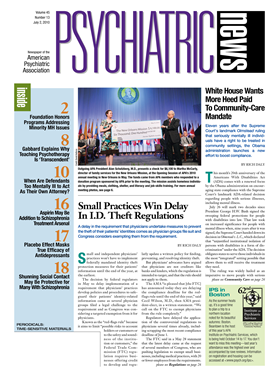As some of you may know, my career in psychiatry has been in the education and training of the next generation of psychiatrists. We must continue to nurture the next generation of clinical and scientific leaders to ensure the continued viability of our Association. Why is this particularly significant now? For the first time in U.S. history, there are four generations in the workplace in the United States: The World War II generation (born 1925-1945), the baby boomers (1946-1964), the generation Xers (1965-1981), and the millennials (1982-2000).
The gen Xers and the millennials are our field's future leaders, educators, researchers, and clinicians. The communication and technological changes they have experienced have already radically altered the way in which they live their lives. They are the most racially and ethnically diverse in our nation's history. The oldest millennials are approaching age 30 and represent most of our medical students and residents. Generation X is moving into its peak family-raising years. They are looking for a less hectic lifestyle and are passionate about their wish for work-life balance.
In part because of my lifelong involvement with our younger colleagues, and in part because I have been concerned about the fall-off in APA membership, particularly among our early-career psychiatrists (ECPs), I decided to hold a series of “town halls” throughout my president-elect term to gain a better understanding of some of the vital issues that are of concern to the next generation.
I held four of these events: one in New York at APA's 2009 Institute on Psychiatric Services, one in Boston at the meeting of the Association of American Medical Colleges, one in Washington, D.C., at the fall meeting of the APA Assembly, and one in May at APA's annual meeting in New Orleans.
Several clear themes emerged at these sessions. Networking and mentoring at both the local and national levels were consistently highlighted as major needs. Lack of dissemination of information about APA in ways that effectively reach our members continues to be problematic, and the Web site has been extremely difficult to navigate. APA needs to be a source of readily available information on a multitude of topics, and these must be easily accessible to members. Although surveys have routinely been done by the Office of Membership, the Assembly Committee of Members-in-Training is developing a survey specifically for ECPs to try to get a better understanding of why this particular group seems to be leaving the organization after training.
My perspective is that we have not done a very good job of outreach. We need to connect our national and academic leaders to local leaders and clinicians. Just as we have had silos in our academic medical centers, we have had silos in our organization. Although there are wonderful ways to use technology, most of us are so overwhelmed with information that it is difficult to absorb every message that reaches our computers, our I-Phones, and our Blackberries, to say nothing of our mailboxes, electronic and otherwise.
Every APA member who is actively involved in the Association has a responsibility to reach out to younger colleagues—in their hospitals, their clinics, their specialty associations, and in their private offices. Invite someone for coffee, breakfast, or lunch. These connections do not need to require major time, effort, or expense. If each of us reaches out, we can have a significant impact.
I plan to help APA establish a national mentoring framework to facilitate this type of interaction. For example, local leadership can offer to do grand rounds at academic medical centers to describe the role of APA in educating legislators and the general public about the issues facing psychiatric patients and to facilitate engagement of our academic leadership. National leaders can work locally to mentor and advise the next generation. A few “pot luck” dinners around the country in some of our major cities (Boston, New York, Philadelphia, Washington, D.C., Atlanta, Chicago, Houston, Dallas, San Francisco, Los Angeles, Denver, Miami) could engage 10 or 20 ECPs and graduating residents at little or no expense to the person holding them. Inviting key academic and clinical leaders to such dinners would also be useful.
I welcome your suggestions and further thoughts about how best to implement a nationwide mentoring program. Please contact me at
[email protected].


